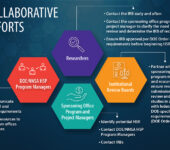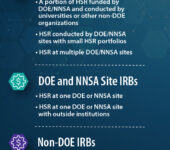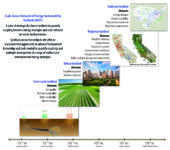BER/BERAC
-

Getting to Know Human Subjects Protection
Overview of the DOE/NNSA Human Subjects Protection Program’s (HSPP) Primary Responsibilities. HSPP reviews, educates, guides, and partners with all DOE and NNSA sites conducting human subjects research to ultimately promote research and protect participants.
-

Community-Engaged Research Design Tips
Incorporating Stakeholder Input Facilitates Robust Project Design. Human subjects research requires a robust scope, timeline, and budget, which can be accomplished by being proactive and incorporating stakeholder input.
-

Collaboration in Human Subjects Research
Sharing Responsibilities. Though each entity involved in human subjects research has a unique role, they must collaborate in a framework of shared responsibilities to protect participants.
-

DOE-Supported Human Subjects Research
Selecting an IRB. Human subjects research conducted or funded by DOE can be reviewed by three types of institutional review boards: central DOE IRBs, DOE and NNSA site IRBs, and non-DOE IRBs.
-

Proposed Network of Energy Sustainability Testbeds Scales
These testbeds comprise a suite of strategically distributed study sites chosen to span a range of scales, each relevant to a particular energy strategy and associated air-water-land forcing. Each testbed could be used for experiments, observations, and modeling to address a unique set of questions. Synthesis across the testbeds could offer an unprecedented opportunity for advancing the fundamental knowledge and tools needed to develop a range of resilient and interconnected energy strategies.